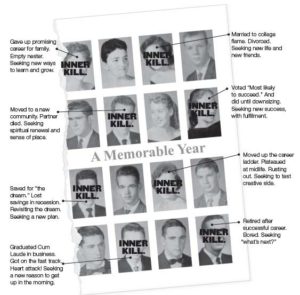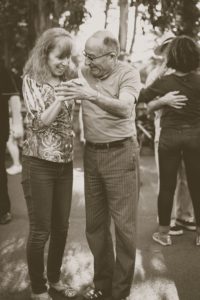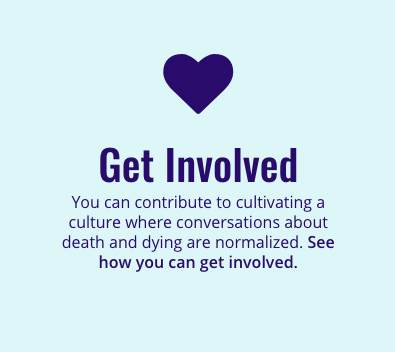What kind of life do you envision at 50? 60? 70? 80? 100?
Will you retire? Should you retire (ever)? When is the right time to retire?
What will be the defining purpose of your days? Instead of narrowing your focus as you age, will you widen it? Instead of withdrawing from life, will you push out your boundaries?
Why do so many aging adults “withdraw,” “retreat,” or suffer from “Inner Kill”—the art of dying without knowing it? Aging without purpose can be a slow death.
Recently, I attended a 55-year college reunion, and it gave rise to a kaleidoscope of emotions and remembrances. We shared our stories of careers, divorce, remarriage, children, and grandchildren. We identified the crucible events that had forged our personalities and attitudes about the world.
A common thread I observed was this: Purpose is fundamental to staying alive and to staying relevant. We need a reason to get up in the morning—a “why” to live longer, better.
I recall the endless “organ recitals” as old acquaintances bemoaned the state of their hearts, or lungs, or kidneys, or livers, or prostates. Information on how to find a good hearing aid or a reliable assisted living space was exchanged. Unexpected destinies were recounted; one former star athlete became a well-known federal judge; another great athlete committed suicide. All this was well and good, but it wasn’t until the conversation turned to death and dying that things really got interesting.
The chapel memorial service brought gasps and tears, not only for the friends I had lost, but for those I now would never have the chance to know.
It made me reflect on my experience of giving the eulogy some years ago for my best friend growing up. We stayed close from kindergarten until his final breath. The words I spoke at his memorial service, the tears I shed over his loss, remain with me to this day. Strange how death quickly brings to life feelings buried alive.
The lack of reimagining retirement is the basis for many premature deaths shortly after retiring. It often leads to Inner Kill—the art of dying without knowing it (or showing it). What is “Inner Kill?”
 Inner Kill is not growing. Giving up on yourself. It’s taking the safe way. Always covering for yourself instead of taking risks. It’s reacting. Not thinking. It’s giving up control of your life to whatever or whoever is around you. Inner Kill is the death of self-respect.
Inner Kill is not growing. Giving up on yourself. It’s taking the safe way. Always covering for yourself instead of taking risks. It’s reacting. Not thinking. It’s giving up control of your life to whatever or whoever is around you. Inner Kill is the death of self-respect.
Some symptoms of Inner Kill:
• You avoid decisions.
• You talk a lot about what you’re going to do. But do nothing.
• You lay awake at nights. Sleepwalk by day.
• Unusual irritability becomes the usual.
• It takes two weekly visits to the liquor store, when once used to be enough.
• You find yourself talking to friends about the same things week after week.
Perhaps the chapel theme should be how to “grow whole, not old.” How to wake up every morning with the intentional purpose of “growing and giving.”
Grow Whole, Not Old
More people are living longer and working longer, up to 30 or 40 years beyond what is considered a normal retirement age. New longevity demands a new mindset. A new mindset needs new life skills.
The truth about retirement is that it can never be any better than our relationship with ourselves. Retirement offers, simultaneously, possibility to grow whole and grow old. Bob Dylan captured the essence by claiming, “He who’s not busy being born, is busy dying.” Dylan is on to the truth that growing older does not mean we stop growing. After all, what does it really mean to “grow old?”
I left the reunion pleased that I’ve spent most of my professional life studying for the age I’ve become. Yet, even so, I found the experience deeply paradoxical, filled as it was with both distress and discovery.
I recall the last lines of Carl Jung’s autobiography, “Memories, Dreams, Reflections” (1963): “I’m astonished, disappointed, pleased with myself. I’m distressed, depressed, rapturous. I’m all these at once and cannot add up the sum.”
The same goes for me. I’m happy just to be alive. At the same time, I embrace the wisdom that the best teacher about life turns out to be death. As the Benedictines teach: “Keep death daily before your eyes.” At any moment, we might breathe out our last breath; it can come at any time. That closeness to death makes life all the much sweeter.
Author, coach, and speaker Richard Leider, is the founder of Inventure – The Purpose Company and author of 10 books, including three bestsellers that have sold over 1 million copies.










